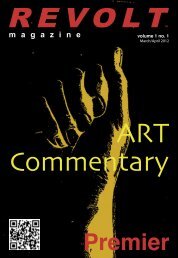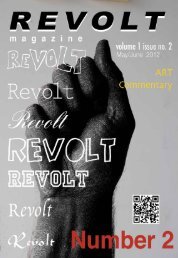Download PDF Version Revolt Magazine, Volume 1 Issue No.4
Download PDF Version Revolt Magazine, Volume 1 Issue No.4
Download PDF Version Revolt Magazine, Volume 1 Issue No.4
You also want an ePaper? Increase the reach of your titles
YUMPU automatically turns print PDFs into web optimized ePapers that Google loves.
THEATREVIEW<br />
Kay Turner's OTHERWISE: QUEER SCHOLARSHIP<br />
BY KATIE CERCONE INTO SONG<br />
A<br />
production conceived and directed by<br />
Kay Turner, Otherwise: Queer Scholarship<br />
Into Song, ran at the Dixon Place on<br />
the lower east side the first week of April.<br />
Intellectually dense, witty, filled with unexpected<br />
high notes and badass funky flows, Kay Turner’s<br />
full-length evening academic post-punk sing-alongsong<br />
excursion had me tipping my hat. Not only<br />
did Turner succeed in making heavy reading sexy<br />
– herself and nearly all female cohort of colleagues<br />
draped in animal print, shimmery lame et all (with<br />
sensible shoes) – I also just want to rhetorically applaud<br />
Turner for banging the mic stand on the floor<br />
ceremoniously throughout the final number.<br />
Inspired by the likes of 10 “Professors of Pleasure”<br />
who have all published new works of queer scholarship<br />
within the past year, Turner hired equal number<br />
of musicians and in some cases performing<br />
artists to “translate” the works into musical scores<br />
for the live performance. Each segment featured<br />
an introduction by the professorial author followed<br />
by the musical interpretation. When not serving as<br />
MC, Turner sang with Gretchen Phillips (known together<br />
as the proto-riot grrl punk and funk lesbian<br />
rock band “Girls in the Nose”) and ended the show<br />
with a musical approximation of her latest publication<br />
Transgressive Tales: Queering the Grimms.<br />
“I want you to go home humming an academic<br />
tome,” said Turner, who had guests singing outloud<br />
academic buzzies<br />
linear time-keeping from within the plush gold confines<br />
of a stage prop Turner called her “Great Chain<br />
of Queer Being.”<br />
Things turned dangerous when Lisa Duggan introduced<br />
her new book Sapphic Slashers. Based<br />
on the 1892 case of a Tennessee woman who<br />
slashed the throat of her female lover and killed<br />
her, the book anchors its narrative in an act largely<br />
motivated by the “inconceivability” of femalefemale<br />
public union in the 19th century southern<br />
United States. According to Duggan’s book, this<br />
incident marks the emergence of the “Lesbian” in<br />
American mass culture and caused distortions that<br />
still haunt American female homosexual mythology<br />
today. Inspired by the book, the evening’s musical<br />
interpretation by Turner with Viva DeConcini and<br />
Mary Feaster weighs “expert” (male) testimony<br />
peddled to the public imagination at that time – ie<br />
“Girl slays girl! Victim of Erotomania! Feast of Sensation!”<br />
- against the truth of women who committed<br />
crimes because they were not permitted to love<br />
one another.<br />
Kay Turner singing “I Prefer My Meanings” with lyrics arranged from Tavia Nyong’o’s forthcoming Little Monsters: A Queer<br />
Bestiary. Photo: Dixie Sheridan.<br />
I can’t believe I’m saying this but, thank god for<br />
booze! Without New Yorker’s dangerously consistent<br />
marriage of spirits and the social, we might<br />
not have radical performing arts laboratories such<br />
as the Dixon Place on the island at all. Started<br />
as a salon in Paris in 1985, Artistic Director Ellie<br />
Covan imported DP to her East Village living room a<br />
year later and maintains its state-of-the-art facility<br />
to this day in part due to the sale of pre and post<br />
show bevs. Not that I generally partake. On the record<br />
I arrived adrenaline drunk on single origin hot<br />
chocolate, giddy and wired enough to take copious<br />
notes throughout the evening.<br />
like “Queer Bestiary” and “collective temporal distortion.”<br />
OTHERWISE was a brave, canon-breaking,<br />
raw and juicy rampage for, through and between<br />
the energetics of queerness.<br />
José “Cuban Missile Crisis” Muñoz started off the<br />
night with Cruising Utopia, a book which explores<br />
intersections between queer futurity and “the Utopian<br />
Kernel of art.” Temporality, particularly as a<br />
site of future-possibility, was a common thread running<br />
throughout the evening. In Carolyn Dinshaw’s<br />
introduction to her book How Soon is Now?: Medieval<br />
Texts, Amateur Readers, and the Queerness<br />
of Time, Dinshaw discussed the “mystical divine<br />
now and the collapse of time” in pre-modern nonsequential<br />
Medieval texts. With Medieval Barbie<br />
as her boxed-in sidekick, Dinshaw boldly collapsed<br />
Before the conclusion of the evening we had heard<br />
from several more scholars and musicians including<br />
Dr. Ann Cvetkovich who’s work on depression<br />
as a public feeling was interpreted by a yellow<br />
jump-suited Dynasty Handbag. An emerging icon<br />
of queer performance, Dynasty has been hailed<br />
a “crackpot genius” by the Village Voice and a<br />
“dislocating mess, in a good way…” by Time Out.<br />
For her interpretation of “Dr. Ann’s” work she<br />
presented an exhilaratingly absurd laptop accompanied<br />
vignette about a nun trapped in the prison<br />
cell of her imagination (lots of tongue wagging and<br />
teased hair). And if all that wasn’t hitting the jugular<br />
of this queer era we live in, we also heard from<br />
“Witch Brew Two,” a New Jersey based “crone” rap<br />
duo with yin-yang duds and an old school Casio<br />
keyboard followed by the lovely Maxine Henryson,<br />
a photographer who’s work portraying the Divine<br />
Feminine of Contemporary India was presented<br />
Kirtan-style by Masi Asare and Chris Williams.<br />
If you missed the show, and wasn’t converted by<br />
the sassy review in the Times (Queer Theory May<br />
Not Have a Beat, but Academicians Can Still Dance<br />
to It) (http://www.nytimes.com/2013/04/06/books/<br />
otherwise-queer-scholarship-into-song-at-dixon-place.html?_<br />
r=0) you can still read the books, that is - flashy<br />
clothing, intoxication, violence, and witchy babes<br />
(optional).





